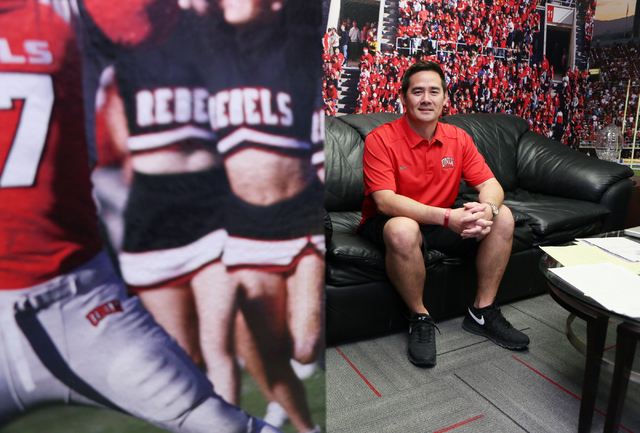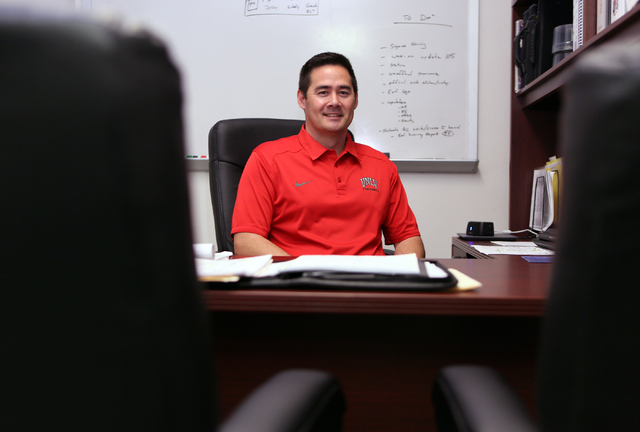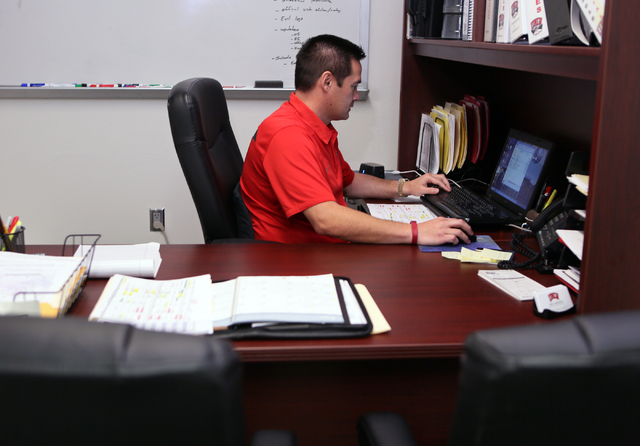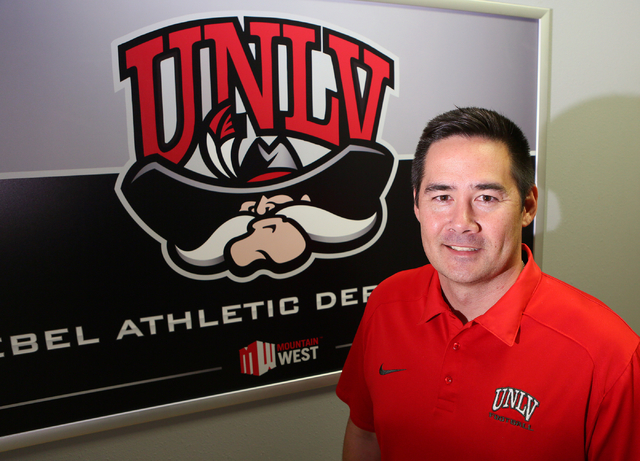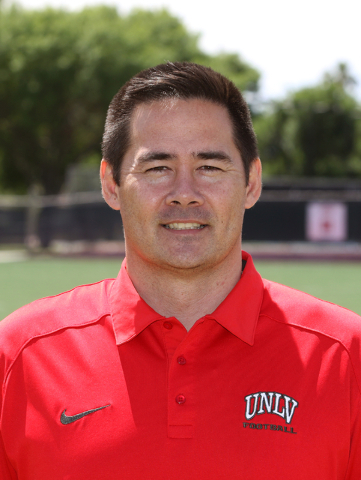UNLV recruiting guru stoked to be back after stroke
Lied Athletic Complex was largely empty on that Tuesday two months ago, but Jimmy Morimoto was still in the building wrapping up another long and busy day.
That dedication is why even as UNLV has gone through head football coaches, he has been one of the few constants.
As the Rebels’ point man for recruiting, Morimoto has earned the trust and respect of Mike Sanford, Bobby Hauck and now Tony Sanchez. He’s organized, thorough, knowledgeable and committed, seeing the long hours the job demands as an opportunity to do what he loves.
But this wasn’t a typical work day. Something didn’t feel right as Morimoto went downstairs and showered. He then sat in a towel in the locker room, not feeling well enough to get dressed, and he couldn’t even stand to grab his cellphone from his locker.
In walked graduate assistant coach C.J. Cox, who noticed right away Morimoto needed help. Cox called Kyle Wilson, the director of athletic training, and Wilson got Morimoto to a hospital.
Morimoto, 41, was diagnosed with a spontaneous subarachnoid hemorrhage, or a form of a mild stroke. He had bleeding around his brain, and spent eight days in the intensive care unit.
“Being a former athlete, I’ve broken bones ... and had many surgeries, but nothing like this,” Morimoto said. “The unknown was scary.”
Because it was a mild stroke, Morimoto’s condition was easier to treat, and his recovery has been much smoother than for many stroke victims. But mild strokes, as he learned, also are the most deadly.
“It’s the scariest one,” Morimoto said. “While I was recovering, the head doctor came in and told me the mortality rate is not very good just because people think it’s a headache, they take a couple of aspirin, go to bed and never wake up. I’m very thankful that it happened here at work because Kyle Wilson — I can’t say his name enough — and his staff were able to assist me and give me the medical help I needed.”
The stroke occurred March 17, a day between spring football practices. Wilson was at UNLV’s baseball game against Grand Canyon when he got the call from Cox. Wilson suspected a stroke, but Morimoto was able to raise his arms over his head, he didn’t slur his speech, and he could smile with no problem.
“It didn’t look like all the traditional signs of a stroke,” Wilson said, “but it didn’t sound like a regular headache.”
The neck pain was sharp, especially when Morimoto lifted his head, and his difficulty with balance told Wilson this was serious, whatever it was.
Wilson called for an ambulance to take Morimoto to Sunrise Hospital and Medical Center. It was there the stroke diagnosis was made, and Wilson stayed with Morimoto until 2 a.m. even though he had to be at work at 6:30. Wilson then returned that afternoon.
Morimoto said he and his wife, Tammie, are forever grateful to Wilson for his concern, but Wilson downplayed his role by saying he’s used to spending long hours with athletes in hospitals following various surgeries.
In Morimoto, doctors discovered someone who can recover quickly. Most patients remain in ICU for three weeks, but he was sent home after eight days.
The mental part of the recovery, though, hasn’t been easy because Morimoto absolutely loves his job. He is limited to working half days, and when Morimoto lingers longer than he should, Sanchez or someone else in the building will tell him to go home.
“Football as a profession is go-go-go, move-move-move,” Morimoto said. “That’s the kind of lifestyle you lead, and it’s kind of hard to go from being high energy, get after it every day, no days off, and then having to sit down and not do anything for a couple of months, (that) is not in me in any way. I need to learn when I go to work to take it easy at times and not try to do everything all at once.”
He coached for 15 seasons — the last two as head coach — at H.P. Baldwin High School in Wailuku, Hawaii, before being hired by Sanford in 2007 as UNLV’s assistant video coordinator. He rose to assistant recruiting coordinator the following season, and then was retained by Hauck in largely the same role and given the title as director of player personnel.
Sanchez made many changes when he was hired from Bishop Gorman High School in December, but he kept Morimoto as the key man in recruiting.
“He’s really organized and really personable,” Sanchez said. “He puts in a lot of hard work and time, and he understands the grind and amount of time you’ve got to put in.
“I’ve known him over the years, too. I’ve been around him since I’ve been at Gorman. We developed a good professional relationship. I had a lot of respect for him coming in.”
Morimoto is thankful to be able to still do what he loves, and more importantly, to be able to wake up each morning next to Tammie. They are parents to four children, and they have two grandchildren.
“It’s sort of scary,” Wilson said. “If C.J. hadn’t gone into the locker room, (Morimoto) might’ve been there until later that night when some of the equipment guys come in. That might’ve been several hours. He might’ve progressed worse where he couldn’t be able to communicate and actually had turned into a full stroke or something worse.”
Contact Mark Anderson at manderson@reviewjournal.com or 702-387-2914. Follow him on Twitter: @markanderson65.



